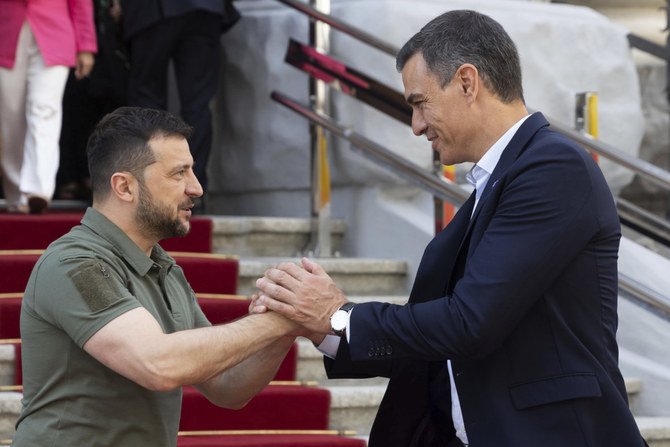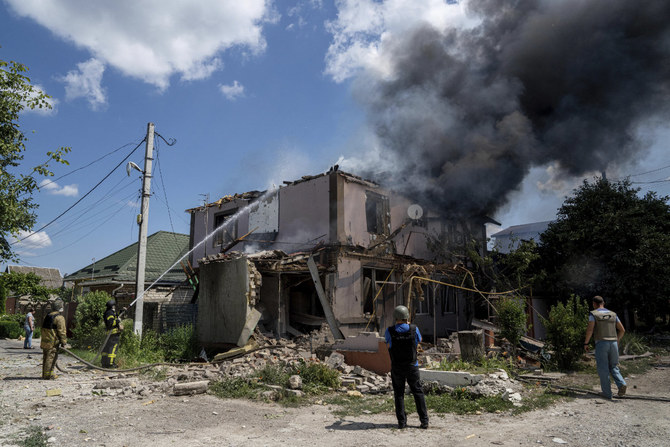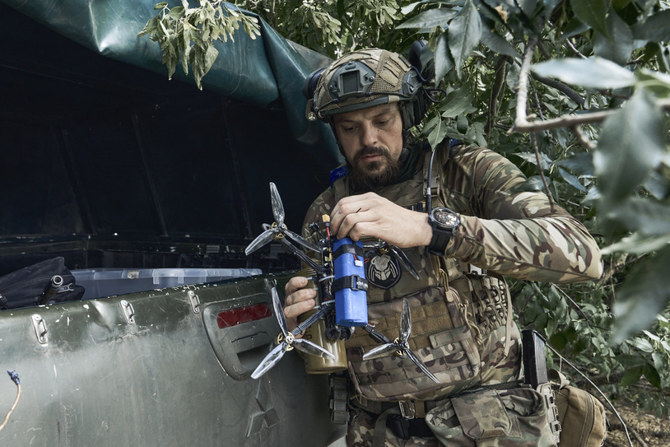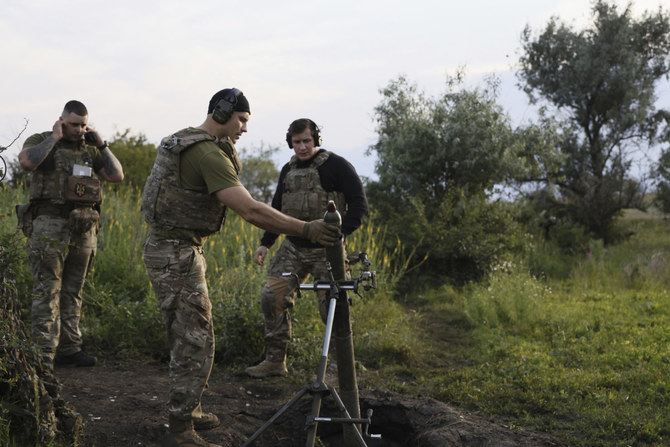KYIV, Ukraine: Ukrainian officials reported more civilian casualties from Russian shelling in the country’s east and south on Saturday, as Spanish Prime Minister Pedro Sánchez began a visit to Kyiv as a show of continuing support from Madrid and the European Union for Ukraine’s fight to dislodge invading Russian forces.
In an address to Ukraine’s parliament that received several standing ovations, Sánchez said, “We’ll be with you as long as it takes.”
“I am here to express the firm determination of the European (Union) and Europe against the illegal and unjustified Russian aggression to Ukraine,” he said on the day that Spain took over the six-month rotating presidency of the 27-nation EU.
At a later news conference with President Volodymyr Zelensky, Sanchez announced Spain would deliver more heavy weaponry to Ukraine including four Leopard tanks and armored personnel carriers, as well as a portable field hospital. He also said Spain will provide an additional 55 million euros to help with reconstruction needs.
Elsewhere in Ukraine, regional officials reported that at least three civilians were killed and 17 wounded by Russian shelling on Friday and overnight in the front-line eastern Donetsk region, where fierce battles are raging, Donetsk Gov. Pavlo Kyrylenko said.
The Ukrainian General Staff reported that fierce clashes continued in three areas in Donetsk where it said Russia has massed troops and attempted to advance. It named the outskirts of three cities — Bakhmut, Lyman and Marinka — as front-line hot spots.
Five people including a child were wounded on Friday and overnight in the Kherson region in the south, regional Gov. Oleksandr Prokudin said. Prokudin said that Russian forces launched 82 artillery, drone, mortar shell and rocket attacks on the province, which is cut in two by a stretch of the 1,500-kilometer (930 mile) front line and still reeling from flooding unleashed by the collapse earlier this month of a major Dnipro river dam.
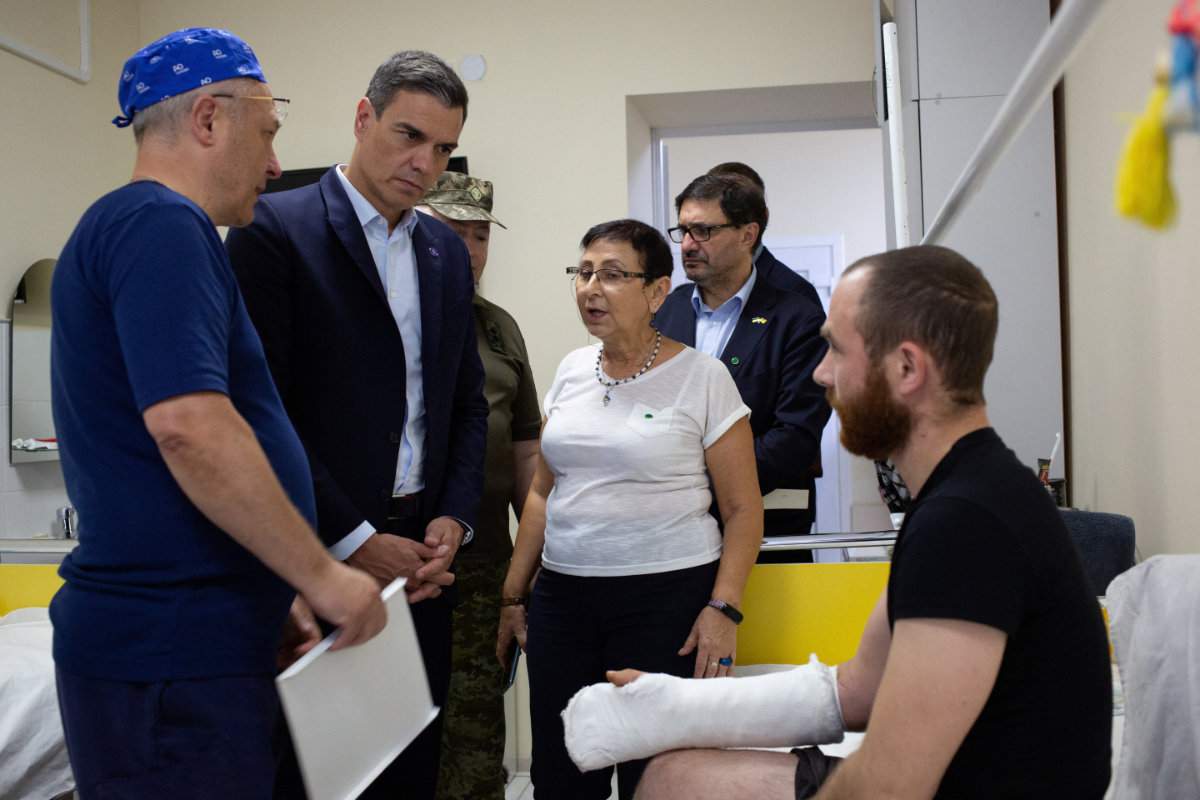
Spanish Prime Minister Pedro Sanchez visits a military hospital in Kyiv on July 1, 2023, amid Russia's attack on Ukraine. (Ukraine State Border Guard photo via REUTERS)
In the northeastern Kharkiv region, Russian shelling over the previous day wounded a 57-year-old civilian man, said Gov. Oleh Syniehubov. In the Sumy region farther west, a teenage boy was hurt in a strike from across the Russian border, the local military administration reported.
Referring to possible peace talks, Sanchez said that “only Ukraine can set the terms and times for peace negotiations. Other countries and regions are proposing peace plans. Their involvement is much appreciated, but, at the same time, we can’t accept them entirely.
“This is a war of aggression, with an aggressor and a victim. They cannot be treated equally and ignoring the rules should in no way be rewarded. That is why that is why we support President Zelensky’s peace formula,” Sánchez added.
Zelensky at the news conference expressed frustration about the lack of clarity over Western training for Ukrainian fighter pilots. He said Western allies have not yet set a timetable to train pilots on US-made F-16s despite their expressions of readiness. “I think that some partners are delaying this process, why they do this I have no idea,” he said.
He also renewed Ukraine’s claim that Russia is prepared to cause a potential nuclear catastrophe at the Moscow-held Zaporizhzhia nuclear power plant as Ukraine continues to make steady advances along the front line.
“Russia is technically ready to provoke a local explosion at the station that could cause an emission of dangerous substances in the air. We are clearly communicating, we discussed the need with our partners so everyone understands why Russia is doing this,” he said.
The introduction of F-16s to the war could give Ukraine a much needed edge over Russia, which currently enjoys air superiority.
Wagner camp in Belarus
Satellite images analyzed by The Associated Press on Saturday showed what appeared to be a newly built military-style camp in Belarus, with statements from a Belarusian guerrilla group and officials suggesting it may be used to house fighters from the Wagner mercenary group.
The images provided by Planet Labs PLC suggest that dozens of tents were erected within the past two weeks at a former military base outside Osipovichi, a town 230 kilometers (142 miles) north of the Ukrainian border. A satellite photo taken on Jun. 15 shows no sign of the rows of white and green structures that are clearly visible in a later image, dated Jun. 30.

In this combination of satellite images provided by Planet Labs PBC, the top one taken on June 30, 2023, shows apparent recent construction of tents at a former military base outside the Belarusian town of Osipovichi. The lower image taken on June 15, 2023, showed no signs of the structures. (Planet Labs PBC via AP)
Wagner chief Yevgeny Prigozhin and his fighters escaped prosecution and were offered refuge in Belarus last week after Minsk helped broker a deal to end what appeared to be an armed insurrection by the mercenary group. The abortive revolt saw Wagner troops who had fought alongside Russia forces in Ukraine capture a military headquarters in southern Russia and march hundreds of kilometers (miles) toward Moscow, seemingly unimpeded.
Belarus’ authoritarian president, Alexander Lukashenko, said his country, a close and dependent ally of Moscow, could use Wagner’s experience and expertise, and announced that he had offered the fighters an “abandoned military unit” to set up camp.
Aliaksandr Azarau, leader of the anti-Lukashenko BYPOL guerrilla group of former military members, told The Associated Press by phone on Thursday that construction of a site for Wagner mercenaries was underway near Osipovichi.
Up to 8,000 fighters from Wagner’s private military force may be deployed in Belarus, a spokesperson for Ukraine’s border force told Ukrainian media Saturday. Speaking to the Ukrainska Pravda newspaper, Andriy Demchenko said Ukraine would strengthen its 1,084 kilometer (674 mile) border with Belarus in response.
Lukashenko previously allowed the Kremlin to use Belarusian territory to send troops and weapons into Ukraine. He has also welcomed a continued Russian armed presence in Belarus, including joint military camps and exercises, as well as the deployment of some of Russia’s tactical nuclear weapons there.
Demchenko told Ukrainska Pravda on Saturday that as of this week, some 2,000 troops from regular Russian army units remained stationed in Belarus.
At a Friday evening gala marking the Belarusian Independence Day, Lukashenko said that the Belarusian armed forces could benefit from training by Wagner members, and asserted that the mercenaries were “not a threat” to Belarusians.
He also declared that he was “sure” Belarus would not have to use the nuclear weapons deployed to its territory, and would not get directly involved in Moscow’s war against Ukraine.
“The longer we live, the more we are convinced that (nuclear weapons) should be with us, in Belarus, in a safe place. And I am sure that we will never have to use them while we have them, and the enemy shall never set foot on our soil,” Lukashenko said.


